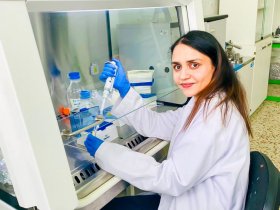Kandeel Shafique


PhD Programme: Technologies for Nanosystems, Bioengineering and Energy
Research group: Bioinspired Nanotechnologies
Supervisor: Beatriz Prieto-Simón
Bio
Kandeel Shafique obtained her Bachelor's degree in Applied Biosciences from National University of Sciences and Technology (NUST), Islamabad, Pakistan, in 2018, followed by Masters in Biology from Lahore University of Management Sciences (LUMS), Pakistan. Her Master's thesis centered on understanding "Hyperglycemia mediated impairments in bactericidal activity of neutrophils" Throughout academic years, Kandeel has done several internships and actively participated in outreach programs and volunteer work. After her graduation, she worked as a research officer in NUST on an industrial project focused on developing a cost-effective point-of-care device for detection of viral infections. Kandeel has years of experience in microbiology and immunology and has a keen interest in innovation and development of bio-inspired solutions to improve the global healthcare system.
Project: Rapid and cost-effective diagnostic tools to fight infectious diseases
We aim to generate a highly sensitive, label-free electrochemical sensing platform for early diagnosis of infectious agents causing life-threatening diseases in both humans and animals, including viral outbreaks such as COVID 19. Early diagnosis is imperative to effective disease management. The developed tools will be harnessed to 1) guide clinical workflow for health system relief, 2) select appropriate treatment, 3) inform prognosis, 4) confirm low enough viral load to recommend patient discharge to free up intensive care units, and 5) prevent the spread of infections, mainly driven via asymptomatic patients.
1. Host response-based diagnostics: The acquisition of personalized information about the host immune response to infection is highly relevant. Infection evolution over time shows that the early detection of biomarkers key during the incubation period, can be harnessed to actuate before pathogen replication and symptoms arise. The idea is to design a biosensing platform based on either single-layer or multi-layers of porous materials for enabling detection of a range of host-derived factors (miRNAs, cytokines, etc.) identified as biomarkers for early diagnosis.
2. Fit-for-purpose diagnostics: Our main aim is to be able to perform sequential detection of biomarkers on a single sensing platform. Sequential detection of various biomarkers can provide important information about the class of virus. Biosensors based on multi-stack hybrid materials will be designed so that each layer plays a different role (i.e., biorecognition, transduction). Non-conductive upper layers, where the capture probe (bioreceptor) will be immobilized, will play a role in biorecognition. A conductive bottom layer will be involved in electrochemical transduction.
Thanks to the tuneable morphology of specific layers, and the possibility to site-specifically modify those layers, this approach is expected to surpass challenges involved when working with complex matrices, e.g. blood, serum, saliva. Lengthy sample processing steps can be avoided by using such platforms. Also, it is label-free detection and does not require previous amplification steps.
News
- Diari Digital de la URV. News: La URV coordina un proyecto para mejorar el diagnóstico precoz de la mastitis bovina a través de biosensores
- Diari Digital de la URV. News: Doctoral researcher Kandeel Shafique will represent URV in the internal phase organised by Marie Skłodowska-Curie Actions for the world-class pitch competition Falling Walls
- MSCA 2022 Conference. Press release: Breaking The Wall of Silent Disease Diagnosis
Outreach activities
- European Researchers’ Night 2021: “Efficient cooling systems for compact high processing microelectronic devices”.
- Falling Walls 2022: “Breaking The Wall of Silent Disease Diagnosis”.



